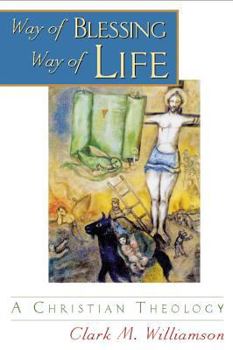Way of Blessing, Way of Life: A Christian Theology
Select Format
Select Condition 
Book Overview
This systematic theology by a distinguished scholar offers a rich and complex weaving together of aspects of theological thought. Informed by such diverse influences as process thought and Holocaust... This description may be from another edition of this product.
Format:Paperback
Language:English
ISBN:0827242433
ISBN13:9780827242432
Release Date:January 1999
Publisher:Chalice Press
Length:346 Pages
Weight:1.20 lbs.
Dimensions:1.0" x 6.0" x 9.0"
Customer Reviews
3 ratings
Way of Blessing, Way of Life: A Christian Theology
Published by Thriftbooks.com User , 18 years ago
Arrived ahead of expectation. Packaged very well. Excellent service.
The Way of Shalom
Published by Thriftbooks.com User , 21 years ago
Clark Williamson spent much of his career focusing upon the development of a Christian theology that is faithful and respectful of the Jewish origins of Christianity, mindful of the diversity inherent in Christian practices over time and in the present, and recognising the need to be relevant and useful in a world where prejudice and superstition in their various guises need to be identified and dismissed. A process theologian, Williamson develops a theological framework that renders many traditional and romantic views of God as unworkable. Similarly, many academically-produced theologies are flawed, due to their lack of appropriate community context, which is the church.Williamson's language is that of faith and blessing. This blessing is well-being - shalom - that Williamson's colleague Gerry Janzen described as 'the divinely intended governing principle'. This is a way that is a way to fullness of life. It is a way intended for communities, and ultimately the whole of creation. Williamson points out the failures of Christianity over time in dealing with non-Christians (and often with other varieties of Christians) with honesty and integrity, so that Christians in their progress will not fall victim to self-deception about the possibilities for the future. Particularly when it comes to dealing with people of the Jewish faith, Williamson describes the history of Christian thought and practice as being one of a death-dealing way. Quoting Raul Hillberg, he explores the three overarching principles: conversion, expulsion, and annihilation. These are things that must be confronted in examining Christian theology for the twenty-first century and beyond - how can a faith that derives from the God of Abraham and Sarah, Isaac and Rebekah, Jacob, Rachel and Leah continue to be oppressive and dismissive of the faith of the people of Abraham and Sarah, Isaac and Rebekah, Jacob, Rachel and Leah? Unlike other prejudicial attitudes in churches (gender, race, etc.), this is one rarely challenged from within, for there are no Jewish persons present in the congregations (generally speaking). By extension, this serves as a model for interfaith relationships with all religions, but there is a special case in Jewish-Christian relations, given that the founders of the Christian faith, and indeed the key figure himself, come from the Jewish people, and never saw themselves as anything but Jewish.Williamson identifies other structural sins of society, to which the church has often been at least a silent bystander, if not a willing participant: the unjust exploitation of nature (the church should call for ecological justice), the unjust distribution of goods and services (the church should strive for economic justice), sexism; racism, and militarism (the church should demand political and social justice).This is a systematic theology. Over the course of the text, Williamson addresses the key points of any systematic theology - ecclesiology, Christology, Do
A faithful theology honest about Christian failures
Published by Thriftbooks.com User , 22 years ago
This is a credible statement of Christian faith for people who need to question everything. Williamson is best known and respected for his pioneering work in Christian-Jewish dialogue, and his respect for Judaism is apparent on every page. His other dialogue partners include feminist and liberation theologies, process theology, narrative theology and the work of Paul Tillich, an early mentor. For Williamson, the one and only criterion to employ in weighing any expression of Christian faith and life is the Gospel, i.e., "the promise of God's love freely and decisively offered to each and all in Jesus Christ and the command of God that justice be done to each and all" (86). This is the criterion that allows him frequently to be scathingly critical of conventional orthodoxies--all in the name of a deeper orthodoxy. Readers may not always agree with his conclusions, but if they don't, they will still have to answer to his fundamental criterion: does it live up to the Gospel?





